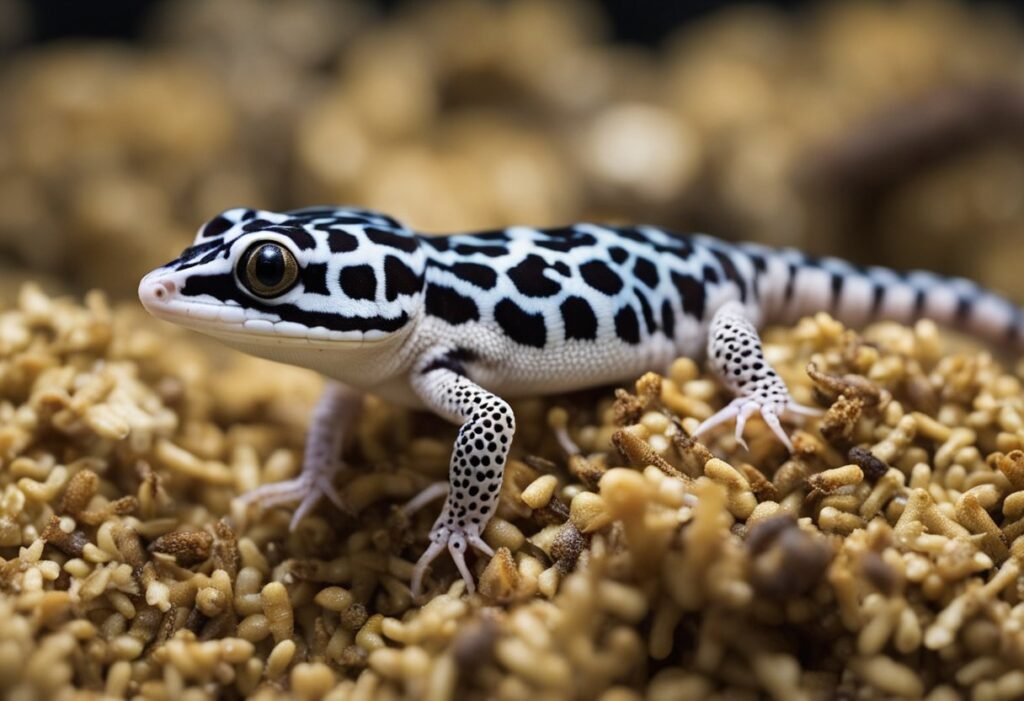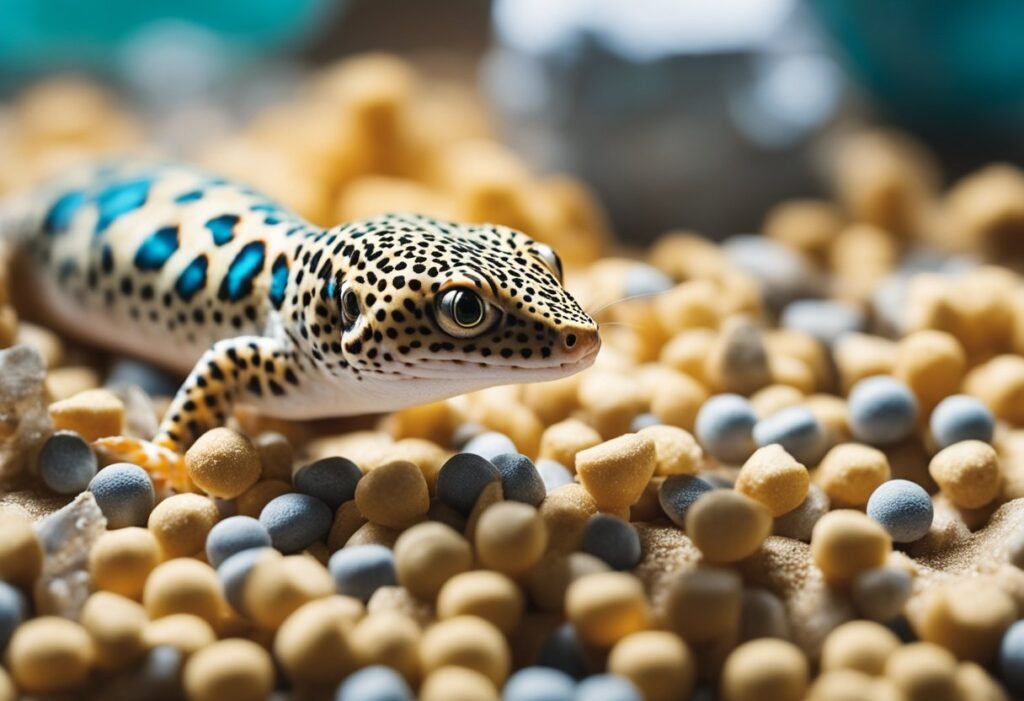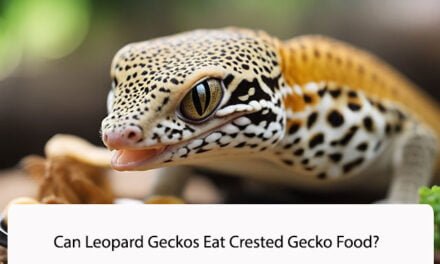Leopard geckos are fascinating creatures that make great pets. They are easy to care for and have a relaxed demeanor, which makes them ideal for beginners. As with any pet, it’s important to ensure that they receive the right nutrition. One of the questions that often comes up is whether leopard geckos can eat fish food.
Fish food is designed for aquatic animals and contains a different nutrient profile than what leopard geckos require. While fish food may contain some of the nutrients that leopard geckos need, it’s not a complete diet and should not be used as a substitute for their regular food. Leopard geckos require a balanced diet that includes live insects, such as crickets and mealworms, as well as a calcium supplement.
It’s important to note that leopard geckos are strict carnivores and should not be fed any fruits or vegetables. Their digestive system is not designed to handle plant matter, and it can cause health issues. While it may be tempting to offer fish food as a treat, it’s best to stick to their regular diet to ensure that they receive the proper nutrition. In the following article, we will explore the reasons why leopard geckos should not be fed fish food and what you can do to ensure that they receive a balanced diet.
Dietary Basics of Leopard Geckos

Leopard geckos are insectivores, which means they primarily eat insects. In the wild, they eat a variety of insects, including crickets, mealworms, and waxworms. However, in captivity, it is important to provide a balanced diet to ensure they receive all the necessary nutrients.
A proper diet for leopard geckos consists of a variety of insects, such as crickets, mealworms, and dubia roaches, as well as occasional treats like waxworms and superworms. It is important to feed them appropriately-sized prey based on their age and size.
In addition to insects, some leopard gecko owners may consider adding other food items to their diet, such as fish food. While fish food may contain some essential nutrients, it is not a suitable replacement for a balanced insect-based diet. It is important to note that some fish food may contain ingredients that are harmful to leopard geckos.
Overall, it is crucial to provide a balanced and varied diet for leopard geckos to ensure they receive all the necessary nutrients to maintain good health.
Understanding Fish Food Composition

When considering whether leopard geckos can eat fish food, it is important to understand the composition of fish food. Fish food is typically made up of a variety of ingredients, including proteins, fats, carbohydrates, vitamins, and minerals.
Proteins are essential for growth and development, and are typically the main ingredient in fish food. They can come from a variety of sources, including fish meal, shrimp meal, and soybean meal. Fats are also important for energy and can come from sources such as fish oil or vegetable oil.
Carbohydrates are often included in fish food as a source of energy, but they are not as important for carnivorous animals like leopard geckos. Vitamins and minerals are also included in fish food to ensure that the fish are getting all of the nutrients they need.
It is important to note that not all fish food is created equal. Some brands may use lower quality ingredients or include fillers that do not provide any nutritional value. It is important to read the ingredients list and choose a high-quality fish food that is appropriate for leopard geckos.
In summary, fish food is typically made up of proteins, fats, carbohydrates, vitamins, and minerals. When choosing a fish food for leopard geckos, it is important to choose a high-quality brand that does not include fillers or low-quality ingredients.
Nutritional Requirements of Leopard Geckos

Leopard geckos are carnivorous reptiles that require a balanced diet to maintain good health. In the wild, they feed on insects, spiders, and other small invertebrates. In captivity, they can be fed a variety of commercially available foods, including live insects, mealworms, and even fish food.
Proteins and Fats
Proteins and fats are essential components of a leopard gecko’s diet. They provide the energy needed for growth, reproduction, and maintenance of bodily functions. Insects such as crickets, mealworms, and waxworms are excellent sources of protein and fat. However, it is important to ensure that the insects are gut-loaded (fed nutritious food before being fed to the gecko) and dusted with calcium and vitamin supplements to provide a balanced diet.
Vitamins and Minerals
In addition to proteins and fats, leopard geckos require vitamins and minerals to maintain good health. Calcium is particularly important for the development of strong bones and teeth. Vitamin D3 is also essential for calcium absorption. These nutrients can be provided through the use of supplements, such as calcium powder and multivitamin supplements.
Inappropriate Foods
While leopard geckos can eat a variety of foods, there are some foods that should be avoided. Inappropriate foods include fruits, vegetables, and processed foods such as dog or cat food. These foods do not provide the necessary nutrients for a leopard gecko’s diet and can lead to health problems. Additionally, feeding live prey that is too large can cause digestive issues or even lead to choking.
In conclusion, a balanced diet is essential for the health and well-being of leopard geckos. Providing a variety of live insects, gut-loaded and dusted with supplements, along with appropriate vitamin and mineral supplements, will ensure that your leopard gecko receives the necessary nutrients for a healthy life.
Risks of Feeding Fish Food to Leopard Geckos
When it comes to feeding leopard geckos, it is important to ensure that they are getting a balanced and appropriate diet. While it may be tempting to feed them fish food, there are several risks associated with doing so. In this section, we will discuss the potential risks of feeding fish food to leopard geckos.
Digestive Issues
One of the main risks of feeding fish food to leopard geckos is digestive issues. Fish food is not designed for leopard geckos and may contain ingredients that are difficult for them to digest. This can lead to gastrointestinal problems such as constipation, diarrhea, and bloating. In severe cases, it can even lead to impaction, which can be life-threatening.
Nutritional Imbalances
Another risk of feeding fish food to leopard geckos is nutritional imbalances. Fish food is formulated for fish and may not contain the nutrients that leopard geckos need to thrive. For example, fish food may be high in protein but low in calcium, which can lead to metabolic bone disease. It may also be deficient in vitamins and minerals that are essential for leopard gecko health.
Toxicity Concerns
Finally, there is a risk of toxicity when feeding fish food to leopard geckos. Some fish foods may contain ingredients that are toxic to leopard geckos, such as preservatives or artificial colors. These can lead to a range of health problems, including liver damage and neurological issues.
In conclusion, while it may be tempting to feed leopard geckos fish food, there are several risks associated with doing so. These include digestive issues, nutritional imbalances, and toxicity concerns. It is important to provide leopard geckos with a balanced and appropriate diet to ensure their health and wellbeing.
Appropriate Diet Alternatives for Leopard Geckos
Leopard geckos are insectivores, which means their diet should consist mainly of live insects. However, some owners may wonder if it’s possible to feed their geckos fish food as a supplement or alternative to live prey. While it’s not recommended to rely solely on fish food, there are some appropriate diet alternatives for leopard geckos.
Live Prey Options
Live prey is the most natural and nutritious option for leopard geckos. The following insects are suitable for leopard geckos:
- Crickets
- Mealworms
- Dubia roaches
- Superworms
- Waxworms (as a treat only)
It’s important to gut-load the insects before feeding them to your gecko. This means feeding the insects a nutritious diet before offering them to your gecko. Additionally, dust the insects with calcium and vitamin D3 supplements to ensure your gecko is getting the necessary nutrients.
Commercial Gecko Food
There are commercial gecko food options available that can be used as a supplement or alternative to live prey. These foods are typically made with a blend of insects and vegetables to provide a balanced diet. Some popular brands include:
- Repashy Crested Gecko Diet
- Pangea Fruit Mix Complete Gecko Diet
- Zoo Med ReptiLinks
While these foods can be convenient, they should not be relied upon as the sole source of nutrition for your gecko.
Supplements and Treats
In addition to live prey or commercial gecko food, supplements and treats can be offered to your gecko. Calcium and vitamin D3 supplements should be dusted on live prey or commercial food to ensure your gecko is getting enough nutrients. Treats such as small amounts of fruit or mealworms can be offered occasionally, but should not make up a significant portion of your gecko’s diet.
Overall, it’s important to provide a balanced and varied diet for your leopard gecko. While fish food may seem like a convenient option, it’s not recommended as a primary source of nutrition. Stick to live prey, commercial gecko food, and supplements/treats to ensure your gecko is getting the necessary nutrients for a healthy life.
Feeding Practices for Leopard Geckos
When it comes to feeding leopard geckos, it’s important to provide a balanced and nutritious diet. While leopard geckos are primarily insectivores, they can also eat some fruits and vegetables. However, it’s important to note that leopard geckos should not be fed fish food.
Fish food is not a suitable food source for leopard geckos as it does not provide the necessary nutrients they need to thrive. Fish food is designed for aquatic animals and contains high levels of protein and fats that are not suitable for leopard geckos. Additionally, fish food can contain preservatives and other additives that can be harmful to leopard geckos.
Instead, we recommend feeding leopard geckos a variety of insects such as crickets, mealworms, and dubia roaches. It’s important to gut-load the insects with a variety of nutritious foods such as leafy greens, carrots, and sweet potatoes to ensure that the leopard geckos are getting the necessary vitamins and minerals.
In addition to insects, leopard geckos can also eat some fruits and vegetables such as papaya, mango, and squash. These should be offered in small amounts as treats and should not make up a significant portion of their diet.
Overall, it’s important to provide a varied diet for leopard geckos to ensure that they are getting all the necessary nutrients they need to stay healthy. Avoid feeding them fish food and stick to a diet of gut-loaded insects and occasional fruits and vegetables.
Conclusion
In conclusion, while leopard geckos may be able to consume fish food, it is not an ideal or recommended food source for them. Fish food lacks the essential nutrients that leopard geckos need to maintain a healthy diet, and may even cause health problems if consumed regularly.
Leopard geckos require a balanced diet consisting of live insects such as crickets, mealworms, and dubia roaches. These insects provide the necessary protein, fat, and vitamins that leopard geckos need to thrive. It is important to vary their diet by offering different insects and occasionally adding supplements to ensure they are getting all the necessary nutrients.
While it may be tempting to offer fish food as a treat or alternative food source, it is best to stick to a diet that is specifically formulated for leopard geckos. By providing them with a balanced and nutritious diet, we can ensure that they live a happy and healthy life.
Frequently Asked Questions
What alternative foods are safe for leopard geckos?
Leopard geckos can safely consume a variety of insects, such as crickets, mealworms, and dubia roaches. It is important to ensure that the insects are appropriately sized for your leopard gecko, as larger prey may cause digestive issues. Additionally, it is recommended to dust the insects with calcium and vitamin supplements before feeding them to your leopard gecko.
Are there any vegetables that are suitable for leopard geckos?
While leopard geckos are primarily insectivores, they can consume small amounts of vegetables as a supplement to their diet. Safe options include leafy greens such as kale and collard greens, as well as squash and carrots. However, it is important to note that vegetables should not make up a significant portion of a leopard gecko’s diet.
Which fruits, if any, can be included in a leopard gecko’s diet?
Leopard geckos do not typically consume fruit in the wild and it is not a necessary component of their diet. However, small amounts of fruit such as strawberries or mango can be offered as a treat on occasion.
What variety of insects can leopard geckos safely consume?
Leopard geckos can safely consume a variety of insects, including crickets, mealworms, dubia roaches, and waxworms. It is important to ensure that the insects are appropriately sized for your leopard gecko and that they are gut-loaded (fed a nutritious diet) before being fed to your gecko.
Are there specific foods that are harmful to leopard geckos?
Leopard geckos should not consume any insects that are larger than the space between their eyes, as this can cause digestive issues. Additionally, insects that are high in fat, such as superworms, should be fed sparingly and not as a staple in their diet.
Is it okay for leopard geckos to eat non-live food, such as dead insects?
Leopard geckos should not consume dead insects as they may contain harmful bacteria or parasites. It is important to only offer live, healthy insects to your leopard gecko as a part of their diet.





